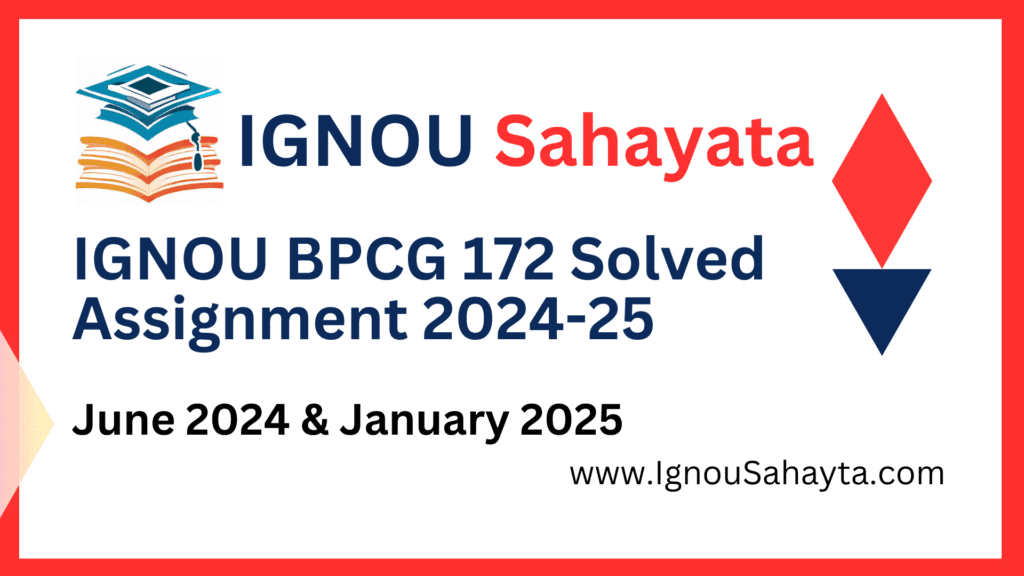Presenting the most recent update to our collection of IGNOU BPCG 172 Solved Assignment 2024–25 PDF Download resources! You are at the correct location if you are enrolled in the BPCG 172 course for the Indira Gandhi National Open University (IGNOU) Bachelor of Arts (General) program. English and Hindi-language assignments are available from us. You may approach the problems this course presents with confidence and accuracy if you use this painstakingly created Solved Assignment PDF.

We explore the fundamental ideas, assignments, and concepts that underpin this course as we delve into the details of IGNOU BPCG 172 in this extensive guide. Our Solved Assignment PDF offers thorough answers and insights to any problems you may be having with challenging subjects or looking for clarification on assignment criteria.
The IGNOU BPCG 172 Solved Assignment 2024–25 PDF Download gives you access to professionally written answers that meet IGNOU requirements. Bid farewell to ambiguity and doubt and welcome to a methodical approach to learning your content and succeeding in your academic endeavors.
Click To Download Full IGNOU BPCG 172 Solved Assignment
BPCG 172 Solved Assignment 2024-25 Hindi Medium
BPCG 172 Solved Assignment 2024-25 English Medium
IGNOU BPCG 172 Solved Assignment 2024-25
The BPCG 172 course offered by IGNOU, titled “Youth, Gender, and Identity,” focuses on the intersection of developmental psychology, sociology, and gender studies, specifically exploring how young people develop their sense of identity in relation to gender and societal norms. This course examines how factors such as age, culture, and social expectations influence the formation of identity during youth. It addresses how gender roles and stereotypes impact self-perception and behavior, providing students with a deeper understanding of how identity is shaped during this crucial stage of life.
In the BPCG 172 assignment, students are expected to engage with topics that critically analyze the roles that youth, gender, and identity play in modern society. These assignments often prompt students to reflect on the social constructs of gender and how they affect young individuals’ self-concept and interaction with the world around them. Students might be tasked with discussing theories of identity formation or examining case studies that illustrate the challenges faced by young people as they navigate gender expectations. This reflection allows students to appreciate the complexity of identity formation and the influence of both internal and external factors.
One key focus of the assignment is to explore how societal norms and media representations contribute to the construction of gender identities among youth. Students may be asked to evaluate how media, popular culture, and social institutions like schools and families reinforce gender roles. This often includes analyzing the pressures faced by young men and women to conform to traditional masculine or feminine roles, as well as the consequences of breaking these norms. Through these assignments, students gain insight into the challenges youth face in developing an authentic identity in a world where gender expectations can be rigid.
Another important aspect of the BPCG 172 assignment is addressing issues related to gender equality and empowerment. Students might explore how young individuals challenge or resist gender norms, particularly in diverse cultural contexts. The assignment may require an analysis of movements advocating for gender rights and equality, or discussions about how gender intersects with other aspects of identity such as race, class. By examining these dimensions, students develop a more nuanced understanding of the ways in which gender and identity interact and evolve during youth.
Through the BPCG 172 course and its assignments, students are encouraged to think critically about the dynamics of youth identity and gender roles in society. The course not only enhances their theoretical knowledge but also empowers them to apply these concepts in real-life contexts, whether it be in personal reflection or social activism. Ultimately, the course provides a comprehensive understanding of how gender and identity are constructed and the implications of these processes for individuals and society at large.